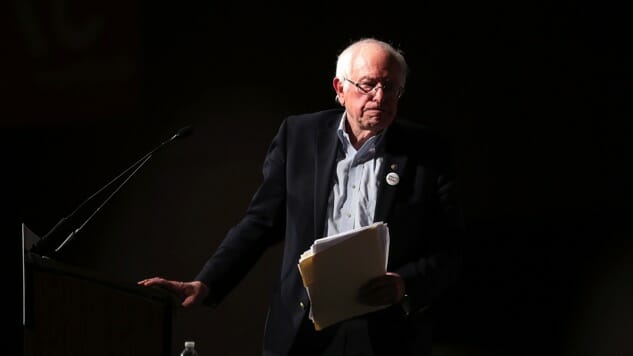This Week, We Find Out if the Media Can Destroy Bernie Sanders
Photo courtesy of Getty
Welcome to Bernie Hate Week. The Iowa caucuses are exactly one week away, and despite a month of fairly torrid anti-Bernie rhetoric—highlighted by, but certainly not limited to, Elizabeth Warren’s claim that he told her in 2018 that a woman couldn’t win the presidency, which led to a post-debate tussle—the polls are more favorable than ever. The last poll to come out, from Emerson, had him leading Biden by nine points, and he’s the leader in three of the last four polls. Nationally, he appears to be finally making a dent in Biden’s previously unshakeable lead. The caucus format is tough for him because of its public nature and the bizarre manner in which delegates are counted, but he nearly pulled off a stunner against Hillary Clinton in 2016, and all the ingredients are there for him to launch his second bid with a big victory in Iowa.
That possibility is anathema not just to supporters of the other candidates, but to corporate media that has long opposed Sanders. Before the Iowa caucuses in 2016, we got the famous 16 negative stories in 16 hours from the Washington Post, which was the most intense of the many anti-Sanders content coming from the corporate media wing that included newspapers, digital outlets, and cable news. And yet even though he had a chance to win Iowa last time, Hillary Clinton had a far greater advantage throughout the greater primary than anyone can claim this time, which means he has a much better shot to win. Considering that, this week should be more rabid by far.
The attacks on Sanders typically avoid policy—a losing battle, since his policies tend to be embraced by primary voters—and come instead in a few broad categories:
1. He’s not electable.
2. He’s sexist.
3. He may not be sexist, but his supporters are sexist, especially online.
In national polls pitting the Democrats against Trump, Bernie is faring just fine, so the first argument hasn’t been as high-volume as we’ve seen in the past. But nos. 2 and 3 are where the media and Sanders’ opponents tend to focus the bulk of their energy. (He’s lucky he’s Jewish, so they can’t run the anti-Semitic playbook that seemed to work so well for corporate British media in hindering the influence of Jeremy Corbyn.) The Warren incident aimed in that direction, but was probably doomed to fail because it devolved into a he-said she-said situation, and because of how cynical the timing looked—the fact that this “news” from 2018 came out just as Warren’s campaign was lagging behind gave the appearance of a staged hit.
Now, though, the tactics are about to hit a fever pitch. Monday morning, the Times ran a story on that old familiar phenomenon, the “Bernie Bro.” It’s an easy sell for mainstream outlets to run these types of pieces, because Sanders has a massive Internet following and they don’t take kindly to bad-faith criticisms of their candidate. Many pundits or writers employed by these outlets have engaged before, and they don’t like being challenged, which is why most interactions tend to happen like this:
my absolute favorite cycle on this website, which i’m lucky to have because it happens once a second, goes like this:
bad faith take on sanders or his policy
|
|
/
bernie supporters contesting it
|
|
/
appeal to some nameless force to rescue them from the bernie bros— Garbage Ape (@GarbageApe) January 26, 2020
When the person involved in the fight is a woman, claims of sexism usually follow, and indeed, sometimes the claims are valid. The problem is that literally every campaign has dirtbag supporters, they all do the same ugly things, and Sanders is the only candidate asked to take responsibility for every anonymous account who tweets something objectionable. It’s a ridiculous standard for anyone, and it happens exclusively with Sanders partly because his following is so much larger than any other candidate except Trump, but also because the existence of a true progressive in the race is threatening to corporate media models that are used to exerting a certain amount of control over the process. In some ways, that’s the crux of this race—it’s a referendum on how much power major papers, cable news, and their ilk actually wield in America. Trump undermined them, in a way, but his election also led to big profits as more people became politically aware after his election, leading to more subscriptions, higher TV ratings, and etc. If Sanders wins, it’s a very different kind of statement that is more like a refutation—a new reality in which the most vociferous attacks can’t budge a skeptical electorate. In that sense, defeating Sanders is more critical for them from an economic perspective than defeating Trump could ever be.
The Times story even referenced people who are themselves Twitter trolls, like Candice Aiston:
-

-

-

-

-

-

-

-

-

-

-

-

-

-

-

-

-

-

-

-

-

-

-

-

-

-

-

-

-

-

-

-

-

-

-

-

-

-

-

-








































